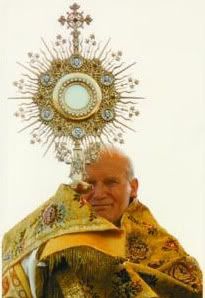We talk about the Church, stuff, and such
Sunday, September 23, 2007
It has come to my attention that law school tends to consume one's time to prodigious degrees. This little corner of the blogosphere was already rather anemic, and I simply don't have anything like the time to do anything with it anymore. For the sake of not pretending, it's best to go ahead and admit that. I'll be leaving the archives online, but I do not expect to be posting in the foreseeable future. Thanks to all our readers. I'll leave everyone with just one little request -- say a little prayer for Charlie Weiss and the football team, they need it.
Thursday, August 09, 2007
K of C Convention
I am just returned from volunteering at the 125th Knights of Columbus Supreme Convention. I'll try and get some details up here over the next several days -- St. Blog's seems to be awefully quiet on the largest gathering of hierarchy in the Western hemisphere. I said "Your Excellency" more times Monday and Tuesday than in the rest of my life put together (and even got in one "Your Eminence"). While I'm at it I'll see if I can't finish cleaning up our color scheme changes and post the rest of my contraception talk.
Update: Rocco seems to have some coverage, focusing primarily on Cdl. Bertone's comings and goings. At least he speaks kindly of the Order. I'll have some tidbits that he doesn't bother to mention, along with some first-hand bits that he just doesn't know.
Update: Rocco seems to have some coverage, focusing primarily on Cdl. Bertone's comings and goings. At least he speaks kindly of the Order. I'll have some tidbits that he doesn't bother to mention, along with some first-hand bits that he just doesn't know.
Labels: K of C
Wednesday, July 25, 2007
Whoops!
It seems that I have neglected to change the tags for our images -- they were hosted on my old school server, which seems to have just recently been flushed. We'll get things back up and running here shortly.
Labels: Housekeeping
Tuesday, July 10, 2007
Calendrical Thoughts
I will refrain, at least at the moment, from babbling about the Motu Proprio. Those who know better and speak better than I on such things are relatively easy to find. Huzzah, three cheers, Deo gratias, indeed. To break my long hiatus, I have, as Monty Python would say, something completely different.
Recently, my parents were in Nashville and had the singular misfortune of attending Mass at Holy Family in Brentwood. (I'm afraid the the tie-dye quilt over the sanctuary, twig crucifix, stadium seating, and do-it-yourself-share-your-faith-journey rite of acceptance combined to force this parish onto my black list after the last visit.) In the homily, Father apparently opined that the liturgical calendar does not make any sense to people in the southern hemisphere, since its cycle of death and rebirth does not coincide with the seasonal cycle of death and rebirth. i.e., Easter isn't in the Spring, thus, Christianity must somehow make much less sense. The inevitable result, then, as the number and percentage of Catholics living in the Southern hemisphere grows, is that the liturgical calendar will have to be revised so that feasts match up with seasons there.
This would make perfect sense -- if Catholicism -- or even mere Christianity for that matter -- were an animistic faith in which observances derived nature and meaning from the weather or the the seasons. Christmas may have been established on a day that facilitated its replacement of the winter solstice as a high holy day among the Germanic tribes. But this does not mean that Christmas derives any of its integral meaning from that association. The same is even more true of Easter, which, unlike some other feasts, is actually a calendrical anniversary, albeit on a different calendar. The meaningful calendrical relationship for Easter is that with Passover -- not (primarily) that with spring. The Church has been successfully spreading the Gospel in the Southern hemisphere for two millennia. The absence of a fully inculturated liturgical calendar hasn't seemed to stop her yet. Sure, the Petrine authority could erect an Australian Rite and publish a Missale Austrinus so that the poor people below the equator could have Easter during their spring. But this seems to cut against catholicity. Was there really nothing to say about the ninth chapter of Luke's gospel?
Recently, my parents were in Nashville and had the singular misfortune of attending Mass at Holy Family in Brentwood. (I'm afraid the the tie-dye quilt over the sanctuary, twig crucifix, stadium seating, and do-it-yourself-share-your-faith-journey rite of acceptance combined to force this parish onto my black list after the last visit.) In the homily, Father apparently opined that the liturgical calendar does not make any sense to people in the southern hemisphere, since its cycle of death and rebirth does not coincide with the seasonal cycle of death and rebirth. i.e., Easter isn't in the Spring, thus, Christianity must somehow make much less sense. The inevitable result, then, as the number and percentage of Catholics living in the Southern hemisphere grows, is that the liturgical calendar will have to be revised so that feasts match up with seasons there.
This would make perfect sense -- if Catholicism -- or even mere Christianity for that matter -- were an animistic faith in which observances derived nature and meaning from the weather or the the seasons. Christmas may have been established on a day that facilitated its replacement of the winter solstice as a high holy day among the Germanic tribes. But this does not mean that Christmas derives any of its integral meaning from that association. The same is even more true of Easter, which, unlike some other feasts, is actually a calendrical anniversary, albeit on a different calendar. The meaningful calendrical relationship for Easter is that with Passover -- not (primarily) that with spring. The Church has been successfully spreading the Gospel in the Southern hemisphere for two millennia. The absence of a fully inculturated liturgical calendar hasn't seemed to stop her yet. Sure, the Petrine authority could erect an Australian Rite and publish a Missale Austrinus so that the poor people below the equator could have Easter during their spring. But this seems to cut against catholicity. Was there really nothing to say about the ninth chapter of Luke's gospel?
Labels: Liturgy
Monday, May 21, 2007
Into Great Silence review
Like Mr. Fitzpatrick, I saw Into Great Silence this weekend. It wasn't exactly what I expected, though I would recommend it to anyone interested in a visually beautiful glimpse of the monastic life.
A detailed review can be found here. I'd agree with most of what Mr. Fitzpatrick says, adding that the film can get a little tedious at points. I can only take so many minutes of pondering the same scenic view of the snow-covered monastery. The good bits more than make up for any shortcomings, however. Favorite scenes included an afternoon of some of the younger brothers frolicking in the snow and a very sweet interview with an elderly brother about being joyful in the face of death because it means going home.
All in all, Into Great Silence is a stunningly beautiful film, and I would recommend seeing it if it is playing near you. I think it has the potential to do a lot of good for vocations. There was a group of very arty, film-student-types in front of me in the theatre, and afterwards, their general consensus was "well, that was interesting. Their life looks really cool." If it can get that sort of response from guys with spiky hair and eyebrow piercings, just imagine what it could do for someone on the verge of discerning a vocation.
A detailed review can be found here. I'd agree with most of what Mr. Fitzpatrick says, adding that the film can get a little tedious at points. I can only take so many minutes of pondering the same scenic view of the snow-covered monastery. The good bits more than make up for any shortcomings, however. Favorite scenes included an afternoon of some of the younger brothers frolicking in the snow and a very sweet interview with an elderly brother about being joyful in the face of death because it means going home.
All in all, Into Great Silence is a stunningly beautiful film, and I would recommend seeing it if it is playing near you. I think it has the potential to do a lot of good for vocations. There was a group of very arty, film-student-types in front of me in the theatre, and afterwards, their general consensus was "well, that was interesting. Their life looks really cool." If it can get that sort of response from guys with spiky hair and eyebrow piercings, just imagine what it could do for someone on the verge of discerning a vocation.
Labels: Art
Sunday, May 13, 2007
Sunday, April 22, 2007
Contraception, Part II
Part I
Our look at the moral theology of contraception continues.
Therefore, if we accept that sex is the necessary physical element of this divinely ordained self-giving reflection of God by man, we can begin to draw some concrete and logical conclusions about it.
I) Sex is not self-centered; it is not, and cannot ever be, about me. It has to be about my spouse, about my act of giving of myself.
II) Sex is not about pleasure. It is pleasurable, and it was created as such by God, but that is one of its qualities, not its purpose. Pleasure is inward-looking, self-centered – the same things we just established sex isn’t. God has attached pleasure to things that are good and necessary for us to do: eating, sleeping, having sex, etc. But God attached that pleasure to these things because He intended life to be joyful and to encourage us to do them because they were good; they aren’t good because they are pleasurable. We’re supposed to derive pleasure from sex, and that’s not precluded by this point or its giving nature. But we do need to remember that sex, like any other human action, has pleasure as a quality, not a purpose.
III) Sex is appropriate only in the context of a permanent relationship: marriage. Because it is a reflection of God’s eternal – and therefore very permanent – self-giving love, it would be entirely inappropriate, and entirely inaccurate, for us to attempt to reflect that love in any kind of transitory or impermanent fashion. As a temporal being, I can’t match God’s perpetual and eternal love: but I can bind myself to the utmost of my capacity, I can have permanence in my love, even if I can’t have perpetuity.
IV) Sex is appropriate only in instances in which its mutually self-giving quality is fully expressed – God’s love has no reservations, holds nothing back, and has no barriers. Therefore, our loving imitation of that love shouldn’t either.
So that’s brought us quite definitively to sex itself. So let’s start into this section by asking, “what, exactly, is sex?” We might think we know the answer, but it’s actually worth looking at. The soul’s side to sex has been outlined above – marriage has a sacramental, spiritual side, of course. The physical side, for our purposes, requires a very precise and slightly graphic definition: the deposition, through the conjugal act, of seminal fluid in the “appropriate receptacle” of a woman.
So right away we can eliminate things like in vitro as not actual sex: no conjugal act.
Also, we can exclude from being sex all non-coital acts: no deposition and no conjugal act, either. As a note, nobody’s outlawing foreplay, but these sorts of activities aren’t sex, and should not be used to take the place of the sexual act itself. There’s a reason it’s called “foreplay.”
Third, and this is the one that will surprise people, we have to exclude anything involving condoms: this can’t be real sex. It has a conjugal act, but there’s no deposition. It renders the sexual act impotent, thus frustrating its very purpose and nullifying it. Thus, we lump condomistic sex with non-coital sexual acts in the category that some have termed “psuedo-sex.”
So let’s backtrack for a second now: we know what sex is, but what is it for? We’ve discussed the theological importance of sex, and we’ll need to bear that in mind, but sex has practical purposes as well, which can be summarized as “babies and bonding” – sex is for reproduction, and sex is for married persons to share and express their bond of love. You need to have these two elements, the procreative and the unitive, to have rightly-ordered sex. You might technically have a full sexual act while frustrating one of these elements (rape and contraception are the two standard respective examples), but it won’t be good sex. What you have then is more akin to Bullemia, where someone forcibly extirpates the nourishing quality of eating while maintaining some of the other qualities in its nature.So we have a seamless garment, in which the these unitive and procreative natures are interwoven. And together, they form what is really just the opposite side of the self-giving-image-of-God nature of sex. These are just two ways of describing the same reality, and they both entail the same things and they have the same prerequisites.
Our look at the moral theology of contraception continues.
Therefore, if we accept that sex is the necessary physical element of this divinely ordained self-giving reflection of God by man, we can begin to draw some concrete and logical conclusions about it.
I) Sex is not self-centered; it is not, and cannot ever be, about me. It has to be about my spouse, about my act of giving of myself.
II) Sex is not about pleasure. It is pleasurable, and it was created as such by God, but that is one of its qualities, not its purpose. Pleasure is inward-looking, self-centered – the same things we just established sex isn’t. God has attached pleasure to things that are good and necessary for us to do: eating, sleeping, having sex, etc. But God attached that pleasure to these things because He intended life to be joyful and to encourage us to do them because they were good; they aren’t good because they are pleasurable. We’re supposed to derive pleasure from sex, and that’s not precluded by this point or its giving nature. But we do need to remember that sex, like any other human action, has pleasure as a quality, not a purpose.
III) Sex is appropriate only in the context of a permanent relationship: marriage. Because it is a reflection of God’s eternal – and therefore very permanent – self-giving love, it would be entirely inappropriate, and entirely inaccurate, for us to attempt to reflect that love in any kind of transitory or impermanent fashion. As a temporal being, I can’t match God’s perpetual and eternal love: but I can bind myself to the utmost of my capacity, I can have permanence in my love, even if I can’t have perpetuity.
IV) Sex is appropriate only in instances in which its mutually self-giving quality is fully expressed – God’s love has no reservations, holds nothing back, and has no barriers. Therefore, our loving imitation of that love shouldn’t either.
So that’s brought us quite definitively to sex itself. So let’s start into this section by asking, “what, exactly, is sex?” We might think we know the answer, but it’s actually worth looking at. The soul’s side to sex has been outlined above – marriage has a sacramental, spiritual side, of course. The physical side, for our purposes, requires a very precise and slightly graphic definition: the deposition, through the conjugal act, of seminal fluid in the “appropriate receptacle” of a woman.
So right away we can eliminate things like in vitro as not actual sex: no conjugal act.
Also, we can exclude from being sex all non-coital acts: no deposition and no conjugal act, either. As a note, nobody’s outlawing foreplay, but these sorts of activities aren’t sex, and should not be used to take the place of the sexual act itself. There’s a reason it’s called “foreplay.”
Third, and this is the one that will surprise people, we have to exclude anything involving condoms: this can’t be real sex. It has a conjugal act, but there’s no deposition. It renders the sexual act impotent, thus frustrating its very purpose and nullifying it. Thus, we lump condomistic sex with non-coital sexual acts in the category that some have termed “psuedo-sex.”
So let’s backtrack for a second now: we know what sex is, but what is it for? We’ve discussed the theological importance of sex, and we’ll need to bear that in mind, but sex has practical purposes as well, which can be summarized as “babies and bonding” – sex is for reproduction, and sex is for married persons to share and express their bond of love. You need to have these two elements, the procreative and the unitive, to have rightly-ordered sex. You might technically have a full sexual act while frustrating one of these elements (rape and contraception are the two standard respective examples), but it won’t be good sex. What you have then is more akin to Bullemia, where someone forcibly extirpates the nourishing quality of eating while maintaining some of the other qualities in its nature.So we have a seamless garment, in which the these unitive and procreative natures are interwoven. And together, they form what is really just the opposite side of the self-giving-image-of-God nature of sex. These are just two ways of describing the same reality, and they both entail the same things and they have the same prerequisites.
Labels: Contraception







